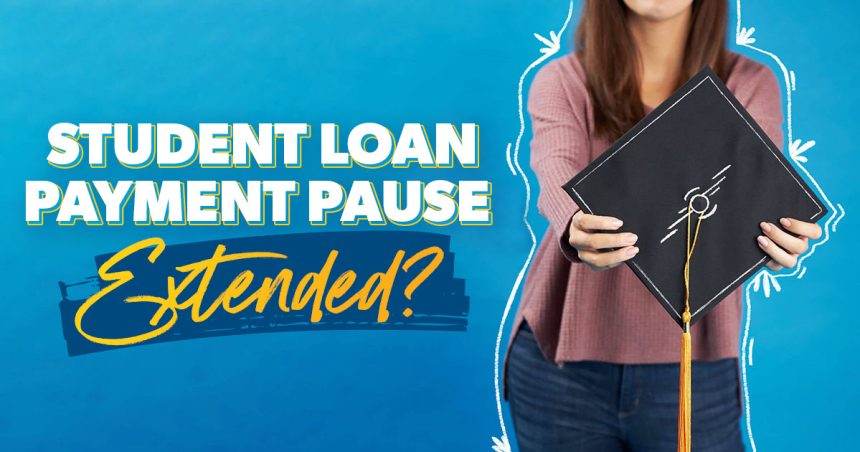Update as of June 2023: Federal student loan payments will resume October 2023—with interest starting back September 1, 2023.
Student loan relief is making headlines once more because—you guessed it—the government extended the pause on student loan payments. Yep. Again.
Now, you might be sitting there thinking, Hooray! No student loan payments for me yet! But hold up. Even though the deadline has been extended (for the eighth time, but who’s counting?), you could be expected to start paying back your student loans sooner than you think.
So, if you’ve been avoiding looking at your student loan account since early 2020, now’s the time to get your budget ready for when those payments start back up again. We’ll dive into all the reasons why, but first, let’s look at what exactly is going on with the student loan payment pause.
When Will the Student Loan Payment Pause End?
Here’s the latest news: Student loan relief has been extended through no later than June 30, 2023.1 Why another extension—especially after President Biden swore up and down that things would start back up in January 2023?
Well, Biden was really banking on his most recent student loan forgiveness plan happening by then. But with several court orders blocking student loan debt relief until further notice, that’s not looking likely. So, to buy borrowers some more time, Biden extended the student loan payment pause until a final decision could be made.
There are several different ways this could play out: Either student loan forgiveness will be approved, or it will be completely shot down (most likely in the Supreme Court). In either case, federal student loan payments will start back 60 days after a decision is made. Or if no decision is made by June 30, 2023, federal student loan payments will automatically start back 60 days after that.
Clear as mud, right? Basically, all you need to know is that federal student loan payments, as well as interest, are still on pause for now. But don’t wait around for this whole forgiveness debacle to get sorted out to take control of your student loans. The time to get ready for it is now.
Why Are Student Loan Payments Paused?
Back at the start of the COVID-19 pandemic in March 2020, the U.S. government passed the CARES Act, which paused monthly payments and stopped interest from stacking up on student loans. People who had lost their jobs or were furloughed were having a hard time making ends meet, so the government put off student loan payments (and interest!) to make things easier on folks. As time’s gone by, our economy and job growth have had ups and downs, and the student loan relief has stuck around.
Will Student Loan Payments Be Paused Again?
This latest extension kicks the can down the road for possibly another six months—which would be the longest extension so far. But will student loan relief be extended again after that?
Payments have been paused for nearly three years. And this is the eighth time it’s been extended. So, we don’t blame you if it’s starting to feel like the boy who cried the end of student loan relief.
But this time is different. Instead of just pushing back the date for another four months, this extension revolves around whatever happens with Biden’s student loan debt relief plan. A decision will have to be made at some point—which means the payment pause will have to end at some point.
Ready to get rid of your student loans once and for all? Get our guide.
So, while it’s always possible it could be pushed back again, you should expect federal student loan payments to start back up as soon as this forgiveness issue is resolved (which could literally be any day).
Should I Wait for Student Loan Forgiveness to Pay Off My Loans for Me?
We know what you’re thinking: Why would I pay off my student loans when they’re going to be forgiven anyway?
Here’s the deal: Biden’s plan is still very much in the air. And you don’t want to be caught off guard if it doesn’t happen. Plus, even if it does get approved, chances are you’ve got more debt than what will be forgiven.
If you’re still on the fence, why not save toward that $10,000 or $20,000 anyway—just in case? That way, if the forgiveness plan falls through, you can still knock out your student loans right then and there. And if your loans actually do get forgiven, you can put that money straight into savings or use it to pay off any other debt you may have. It’s a win for you either way!
But don’t wait to pay off the rest of your student loans because you’re banking on them eventually being forgiven too. Why? Because student loan forgiveness isn’t guaranteed.
Biden may forgive some student loan debt now, but it doesn’t mean there’s more to come. Holding out for your debt to be forgiven is a big gamble—a risk you can’t afford to take. But by paying off the rest of your student loans as fast as you can (instead of waiting on the White House), you’ll save yourself a ton of time and stress. And a good chunk in interest too.
How to Prepare for the End of Student Loan Relief
So, what if you have more student loan debt than Biden plans to forgive? Well, you’ll have to start making payments again sometime in 2023. The good news is, you have some time to prepare, so there’s really no excuse to be shocked and surprised when those payments hit again. This is your heads-up.
Start Paying Back Your Student Loans Now
The best thing you can do to prepare for the end of student loan relief is to start making those payments right now. We know—this sounds pretty weird. Why should you pay your student loan payments if they’re on pause? Because the interest alone will eat you alive.
Right now, you can keep making those payments and not pay any interest. None. Zip. Zero. Nada. Your payment goes directly toward knocking down the principal amount—that’s huge. The sooner you take advantage of this zero-interest deal, the less you’ll pay in the long run. Trust us, now’s the time to keep up with the payments and make some serious progress on paying toward your student loans!
Budget for Your Student Loan Payment
If you haven’t been paying on your student loans since early 2020, now’s the time to get your budget ready to handle your student loan payment again.
But let’s be honest. A lot has happened in the last few years (including inflation), and that $400 payment will probably feel heavier than it did before. The good news? There are plenty of ways to cut back and get some extra cash in your budget—you just have to look for them.
You’ll also have to be more on top of your spending if you want to be sure you can cover the basics and your debt payments. Start budgeting for free with EveryDollar and make a plan for your money every month.
If You Have Other Types of Debt Plus Your Student Loan Debt
With the debt snowball, you pay off your debts from smallest to largest. So, if you have other debts (like a car loan) that are less than the amount of your student loan debt, you need to focus on paying off those small debts first while still making the minimum payment on your student loans.
Here’s how that debt snowball plays out: Once you totally pay off a debt, take the amount you were paying on it and add that to the amount you’ll pay on the next debt. You’re adding to your snowball and packing it with more cash to knock out your debts one by one as you go.
If You Only Have Student Loan Debt
If you’re in Baby Step 2 (pay off all debt except the house) and the only debt you have is this student loan, then you need to get serious about paying it off. Don’t keep it around like it’s a pet. Get rid of this thing as fast as you can! That means you should pour any extra money you’ve got onto this pile of debt until it’s out of your life for good.
Make Sure Your Information Is Correct
This feels like a weird thing, but if you haven’t paid on your student loans in several years, you’d better make sure your loan servicer has your correct information. A lot can change in that time. Did you get married? Change your last name? Move to a new place? It’s a good idea to double-check that your loan servicer has all your correct info on hand before that first payment is due.
On top of that, make sure you know who’s servicing your loan now, because it might have changed in the last two years. For example, Navient isn’t servicing federal loans anymore. All of their loans are now handled by Aidvantage.
Should I Apply for Deferment, Forbearance or Income-Based Repayment?
If you think you’ll have trouble making student loan payments when they kick in again, forbearance and income-based repayment are two popular pieces of “advice” folks will give you. But that doesn’t mean it’s good advice. Our documentary, Borrowed Future, dug into this to expose the dark side of the student loan industry. Here’s the truth they don’t want you to know:
Deferment or Forbearance
Applying for things like deferment or forbearance on your student loans might feel like a Band-Aid to help you out, but it doesn’t fix the problem. All it does is delay things—aka keep you in debt even longer. Plus, once student loan relief ends, your loans will keep growing interest even while they’re in deferment or forbearance. That just means your problem will keep getting bigger and bigger.
And if you’re hoping to defer because you were behind on your student loans before the pause, there’s some good news for you. Back in April 2022, Biden announced a “fresh start” initiative to help borrowers with federal student loans in default.2 These folks will have the chance to start the repayment process back in good standing. But it’s still not clear what steps they’ll need to take to actually make this happen.
Income-Based Repayment
These income-based repayment plans might look nice at first with their promises of a shiny, new lower monthly student loan payment. But not so fast. They also drag out your loan for way longer. And most of the time, that means you’ll pay thousands more over time. No thanks!
Take Control of Your Student Loans
Listen, waiting on the government to solve your problems is never a good idea. Politicians are in the business of making promises they can’t keep. But you don’t have to live your life based on what’s happening in the White House. In fact, you have the power to take control of your student loans yourself. It may feel impossible right now, but it’s all about taking one small step at a time. Student loan debt doesn’t have to define you. It’s time to kick those loans to the curb—and get your life back!
Sick and Tired of Student Loan Debt?
Explore your options and get a game plan with our Guide to Getting Rid of Your Student Loans.
Get the Guide
Sick and Tired of Student Loan Debt?
Explore your options and get a game plan with our Guide to Getting Rid of Your Student Loans.
Get the Guide
Read the full article here
















